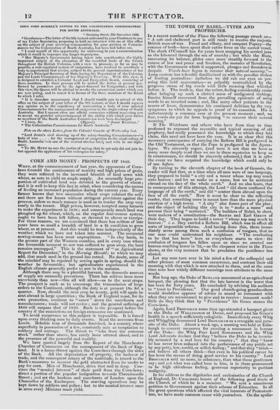CORN AND MONEY: PROSPECTS OF 1840.
WHEN, at the commencement of last year, the opponents of Corn- laws foretold the continuance of scarcity and high prices of grain, they were referred to the increased breadth of land sown with wheat, as sure to yield an ample supply. An unusually large pro- portion of cultivated land was devoted to the growtn of wheat ; and it is well to keep this fiat in mind, when considering the means of feeding an increased population during the current year. Every farmer knows that two successive wheat crops exhaust the soil; and there are few leases without stringent provisions against the process, unless so much manure is used as to render the crop very costly to the tenant. High prices, however, tempted many farmers to make the experiment in 18138 ; and consequently much land was ploughed up for wheat, which, on the regular four-course system, ought to have been left fallow, or devoted to clover or turnips. For these reasons, we are convinced that there has seldom of late years been so small a breadth of land in a fit condition to grow wheat, as at present. And this would be true independently of the weather, which we have not taken into account. The autumnal sowing-season has been most unpropitious. "In clay lands, in the greater part of the Western counties, and in every case where the thvourable moment to sow was suffered to pass away, the land remains uncropped." This is the statement of "an Agricultural Report for December," in the Morning Herald; to which we may add, that much seed in the ground has rotted. No doubt, some of the mischief may be repaired by sowing again in spring, should the weather be favourable ; but agriculturists experienced in the English climate generally prefer to sow in the autumn. Although there may be a plentiful harvest, the domestic sources of supply are unusually precarious. There has seldom been more uncertainty than now—this all will allow—as to the next crops. The prospect is such as to encourage the transmission of large orders to the Continent, although the duty is at present 188. M. a quarter. Now, should the next crop be scanty, gold will again be sent abroad in large quantities ; the Bank of England must, for its own protection, continue to "screw" down the merchants and manufacturers; trade will not revive ; and the general suffering of 1840 will surpass that of 1839. Such is the prospect before the country if the restrictions on Ibreign commerce are continued.
To avoid recurrence to this subject is impossible. It is forced upon every thinking man by daily events. Read the accounts from Leeds. Beholds tens of thousands flunished, in a country where superfluity in possession of a few, constantly nets as temptation to robbery and outrage. The threat to "take from the common stock' rather than starve, has rarely been uttered aloud, and in the presence of the powerful and wealthy. 14'e have quoted largely from the Report of the Manchester Chamber of Commerce on the management of the Bank of Eno- land. It is a home.thrust against the Corn-laws through the sides of the Bank. All the depreciation of/property, the badness of trade, and the consequent misery of the multitude is traced to the Bank's measures to recover the gold abstracted multitude, its vaults to pay fbr corn. Men of Manchester, drive that nail in deep. Con- wilco the "monied interest" of their peril front the Corn-laws ; direct a portion of the popular indignation towards Threadneedle Street ; and set the bankers and merchants of London upon the Chancellor of the Exchequer. The starving operatives may be kept down by soldiers and police; but to the mottled interest once in arms every Minister must yield.
































 Previous page
Previous page